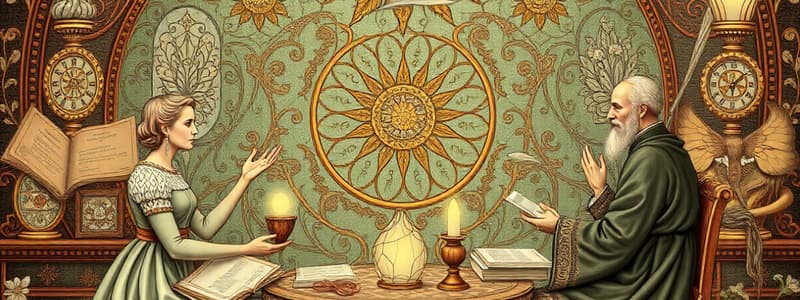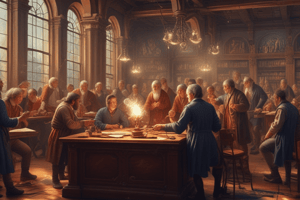Podcast
Questions and Answers
Which scholar is known for significant contributions to both mathematics and astronomy during the Reconquista and Crusades?
Which scholar is known for significant contributions to both mathematics and astronomy during the Reconquista and Crusades?
- Alhazen
- Averroes
- Jabir ibn Hayyan
- Al-Khwarizmi (correct)
Which of the following scholars is primarily known for their advancements in optics?
Which of the following scholars is primarily known for their advancements in optics?
- Alhazen (correct)
- Ptolemy
- Avicenna
- Isidore of Miletus
Which scholar is recognized for integrating Aristotelian philosophy with Islamic thought?
Which scholar is recognized for integrating Aristotelian philosophy with Islamic thought?
- Al-Khwarizmi
- Averroes (correct)
- Isidore of Miletus
- Jabir ibn Hayyan
Who among the following is known for their contributions to medicine during the Reconquista and Crusades?
Who among the following is known for their contributions to medicine during the Reconquista and Crusades?
Which text or figure had a significant impact on Latin Europe's access to critical scientific knowledge during the Reconquista?
Which text or figure had a significant impact on Latin Europe's access to critical scientific knowledge during the Reconquista?
What is the primary focus of the philosophical tradition discussed?
What is the primary focus of the philosophical tradition discussed?
What major historical event contributed to the decline of Greek scientific thought in Latin-speaking Western Europe?
What major historical event contributed to the decline of Greek scientific thought in Latin-speaking Western Europe?
During which time period did the understanding of Greek scientific thought diminish in Latin-speaking Western Europe?
During which time period did the understanding of Greek scientific thought diminish in Latin-speaking Western Europe?
Which of the following statements best characterizes the philosophical tradition mentioned?
Which of the following statements best characterizes the philosophical tradition mentioned?
What was a significant effect of the early Middle Ages on the scientific discourse in Western Europe?
What was a significant effect of the early Middle Ages on the scientific discourse in Western Europe?
Flashcards
Naturalistic Philosophy
Naturalistic Philosophy
This philosophical tradition emphasizes explanations of phenomena based on natural causes, avoiding supernatural or mystical explanations.
Early Middle Ages
Early Middle Ages
The period in Western European history from 400-1000 CE, marked by a decline in the understanding of Greek scientific thought.
Greek Scientific Thought
Greek Scientific Thought
The scientific and philosophical knowledge of ancient Greece, including figures like Aristotle and Pythagoras.
Decline of Greek Scientific Thought
Decline of Greek Scientific Thought
Signup and view all the flashcards
Latin-Speaking Western Europe
Latin-Speaking Western Europe
Signup and view all the flashcards
Reconquista
Reconquista
Signup and view all the flashcards
Crusades
Crusades
Signup and view all the flashcards
Aristotle
Aristotle
Signup and view all the flashcards
Ptolemy
Ptolemy
Signup and view all the flashcards
Impact of Byzantine and Islamic Science on Latin Europe
Impact of Byzantine and Islamic Science on Latin Europe
Signup and view all the flashcards
Study Notes
Great Scientists of Europe
- The history of science is connected to historical events, progressing from ancient times. Natural, social, and formal sciences are encompassed. Early contributions in mathematics, astronomy, and medicine were crucial to classical Greek natural philosophy.
- This philosophy sought natural explanations, not supernatural ones, for phenomena.
- Following the Roman Empire's fall, Greek scientific knowledge was diminished in Western Europe (400-1000 CE). However, the Arabic-speaking Muslim world preserved and expanded this knowledge during the Islamic Golden Age.
- The Scientific Revolution (16th-17th centuries) in Europe differed from earlier Greek traditions. A more mechanical worldview emerged, emphasizing mathematical analysis and empirical methods.
- The 18th and 19th centuries brought fresh perspectives on energy, while the 20th century saw advancements in genetics and physics, leading to new disciplines.
Philosophy of Nature
- Plato and Aristotle's works significantly shaped early natural philosophy.
- Plato emphasized geometry's importance while Aristotle used observation to study nature. Aristotle identified over 540 animal species.
- Archimedes (c. 287-212 BCE) made significant contributions to mathematics and physics, including the principle of buoyancy.
European Science in the Middle Ages
- By the 11th century, most of Europe was Christian, with increased monarchies, food production improvements, and rising populations.
- Latin translations of Greek texts were done from Arabic and Greek sources. This stimulation of learning followed earlier challenges and efforts to understand human bodies.
- The 12th century saw the rise of medieval universities (Bologna, Paris, Oxford, Cambridge). Knowledge increased due to contact with Byzantine and Islamic scholars.
- The 13th century saw better translations of essential ancient writings, facilitating a stronger exchange of scientific ideas.
- Roger Bacon and Albertus Magnus advanced natural philosophy based on these texts.
- The Black Death in 1348 halted scientific progress.
Galileo Galilei (1564-1642)
- Galileo was known as the "father of modern observational astronomy".
- He significantly improved the telescope and made key astronomical observations (e.g., Jupiter's moons, phases of Venus, sunspots).
- His work laid the foundation for modern physics and the scientific method.
- His support for heliocentrism created conflict with Church authorities and resulted in his trial and house arrest.
Isaac Newton (1643-1727)
- Newton formulated laws of motion and universal gravitation, influencing celestial mechanics and classical mechanics.
- His work was important during the English Civil War and Glorious Revolution.
- He was a Christian and believed in a rational universe created by God.
Charles Darwin (1809-1882)
- Darwin's theory of evolution by natural selection, outlined in "On the Origin of Species," changed biological science.
- His work explored the diversity of life on Earth and challenged existing creation beliefs.
- It occurred during important social changes
Marie Curie (1867-1934)
- Curie was a pioneering physicist and chemist, famous for her research on radioactivity.
- She discovered polonium and radium, winning two Nobel Prizes.
- Her work advanced medical treatments using radiation and broke barriers for women in science.
Alessandro Volta (1745-1827)
- Volta invented the electric battery (Voltaic Pile), the first reliable source of continuous electric current.
- His work was significant in electrochemistry.
- It was during the Age of Enlightenment when Volta's contributions were made.
Michael Faraday (1791-1867)
- Faraday made important contributions to electromagnetism and electrochemistry.
- He discovered electromagnetic induction and formulated Faraday's laws of electrolysis.
- His work was developed during the Industrial Revolution.
Sigmund Freud (1856-1939)
- Freud founded psychoanalysis, a clinical method for treating mental disorders.
- His theories on the unconscious mind, defense mechanisms, and childhood experiences profoundly affected psychology.
- His work occurred during significant European political changes, especially leading up to World War II.
Albert Einstein (1879-1955)
- Einstein developed the theory of relativity, particularly E=mc².
- His work revolutionized space, time, and energy concepts.
- It was during a time of significant European political change.
Studying That Suits You
Use AI to generate personalized quizzes and flashcards to suit your learning preferences.




